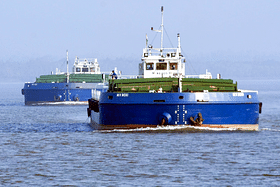The development of this grid will not only boost regional integration and accelerate development but it will further deepen eastern India’s trade within BBIN countries (Bangladesh, Bhutan, India, Nepal).
It will also further amplify trade potential with countries like Myanmar, Thailand, Malaysia and Singapore.
The government aims to develop the Eastern Grid with 5,000 km of waterways, announced Sarbananda Sonowal, Union Minister of Ports, Shipping and Waterways.
He was speaking at the second Inland Waterways Summit organised by PHD Chamber of Commerce and Industry (PHDCCI) in the national capital, as per reports.
Addressing the event, the minister said, “Under the dynamic leadership of Prime Minister Narendra Modi, the government is working extensively to develop the Eastern Grid with more than 5,000 kms of navigable waterways, and we are encouraged by the results of work done on National Waterways 1 — the river Ganga”.
At the event, attention was drawn to the vast potential of the eastern regions of India, particularly the extensive network of rivers and the potential for trade, which the government plans to harness for economic growth and development.
The minister added, “Given the rich interweb of rivers in eastern India, which comprises four key waterways along with certain international routes, we intend to develop this huge potential of 5,000 kms of navigable waterways through this grid. The development of this grid will not only boost regional integration and accelerate development but it will further deepen eastern India’s trade within BBIN countries (Bangladesh, Bhutan, India, Nepal). It will also further amplify trade potential with countries like Myanmar, Thailand, Malaysia and Singapore.”
The government plans to establish an economic corridor connecting North East India with the rest of the country via Bangladesh.
The network will span 3,500 kms by linking National Waterway (NW)-1 (Ganga), NW-2 (Brahmaputra), and NW-16 (Barak).
“This will also link Bhutan and Nepal with Bangladesh onto the international trade routes through multi-modal connections developed in India. As India develops Sittwe port in Myanmar, the regional economic integration, cooperation and amplification can smoothly happen among BBIN — BIMSTEC — ASEAN countries,” Sonowal added.
This initiative will enhance North East India’s growth, increase its market accessibility, and create employment opportunities for over 600 million people.
It will further offer tactical benefits, including access to global trade routes and the ability to withstand climate changes. The transport mode powered by green hydrogen, electricity, and LNG promotes environmental friendliness.
The second Inland Waterways Summit organised by PHDCCI, was based on the theme of ‘Tapping into the power of Inland Waterways: promoting growth, trade and prosperity’.
The summit aims to examine the capacity of inland waterways for regional economic integration and sustainability.
The event including participation of senior officials from Inland Waterways Authority of India, Ministry of Ports, Shipping & Waterways, Gati Shakti Development Forum along with several industry leaders, policy advocates, industrialists, entrepreneurs.


